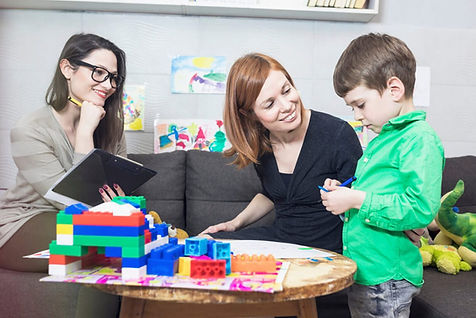Applied Behavior Analysis
Applied Behavior Analysis
Applied behavior analysis (ABA) is widely identified as one of the best evidence-based treatments for the social and behavioral symptoms of autism and related intellectual and developmental disabilities (IDD). At its’ core, the purpose of ABA is understanding behavior; specifically, how behavior is learned and maintained.
The primary goal of ABA is to teach and reinforce skills that help an individual thrive, while reducing any behaviors that may place the individual or others at risk of harm or may interfere with learning or participation in activities. This is accomplished by first identifying an individual’s unique strengths, areas of need, and clinical goals, determining why and when certain behaviors may occur, and then developing an individualized intervention to work towards goals in targeted areas of need. ABA services help individuals achieve their goals and maximize their ability to participate fully in daily activities. Our services are also important because we provide ongoing support to their family members and other stakeholders such as caregivers and teachers.
For additional information about ABA therapy or to learn more about our services, reach out to our Family Support Team at 888-998-8590 or connect with us online to learn more.

What Skills Does ABA Target?
ABA therapy involves the use of scientific principles proven to increase desired, adaptive behaviors while simultaneously decreasing behaviors that are destructive or dangerous. We work with our clients and their families to develop individualized goals to target during ABA therapy across all areas of daily life, including social, academic, communication, and self-care skills and routines. Additionally, we work to develop interventions targeting the reduction of interfering behavior that may occur across one or many of these activities. Our ultimate goal is to help our clients develop the skills they need to increase independence and thrive.
Examples of target skills that our providers may work with clients to develop include:
- Developing and following a daily schedule
- Transitioning to and from school
- Completing self-care routines such as dressing, bathing, and toothbrushing
- Increasing communication skills
- Developing or increasing play skills
- Improving social skills such as playing with others, sharing, engaging in reciprocal communication
- Learning skills related to employment (e.g., typing, greeting customers, filing, sorting)
Contact our Family Support Team today to learn more about how our providers can help.
What to Expect in ABA Therapy Sessions

Behavioural Assessments
The purpose of the FBA is to determine why challenging behavior occurs, as well as to identify a client’s unique strengths and areas of need. The FBA provides the foundation for effective, highly individualized intervention.
The FBA generally occurs across multiple visits and includes a review of records, interviews with the client and caregivers, observation of behavior at home and other settings, and the use of direct assessment methods such as descriptive assessments or functional analysis.
At the conclusion of the FBA, the BCBA will review all findings with the client and their family and provide recommendations for services.

Ongoing ABA Services
Our clinical team includes both the supervising BCBA and one or more behavior technicians (BTs). BCBAs are responsible for developing individual treatment plans for our clients, monitoring progress towards goals and modifying treatment plans to maximize client programs. Our BCBAs also provide ongoing supervision to our team of BTs and provide education and support to parents and other stakeholders.
Our trained clinicians have extensive experience in the design, implementation, and management of ABA treatment plans. Through ongoing assessment and review of clinical data, we can target various behaviors and help guide our clients to long-term success.

Parent Education and Support
Family participation in ongoing parent education and support sessions is integral to our clients’ ongoing success, so our BCBAs will schedule sessions regularly to help caregivers learn how to implement all necessary components of the treatment plan, as well as to collect data on their loved one’s progress. Ideally, parent education and support sessions will be conducted weekly or biweekly, and these sessions will include observation of our team working with your child, role-play with our team, and supported implementation of the intervention plan with your child. Data will be collected on performance during these sessions, and will be reviewed with you so you can monitor progress.
Reach Out to Ascend ABA Today
We believe in providing ABA therapy that grows with your child, which means that at Ascend ABA, your loved one can participate in ABA services from their initial diagnosis through to adulthood. If your child has been receiving ABA services elsewhere and has aged out of that program, we are here to help by developing programming that ensures continuity of care.
Contact us today for more information on how we can help your child reach their goals, whether they are newly diagnosed, have aged out of other programs, or are new to ABA altogether:

ASCEND ABA
Ascend, Together
If you’re ready to learn more about our ABA therapy programs, contact Ascend ABA and our Family Support Team will be happy to connect you with the resources you need.
